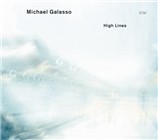Home » Jazz Articles » Album Review » Michael Galasso: High Lines
Michael Galasso: High Lines
On High Lines Galasso tries to find the connections between all the styles, genres, idioms, and traditions that he juggles, and he manages to tie all these threads into a cohesive and poetic collection of sixteen short compositions. He is aided by Norwegian guitarist Terje Rypdal, who improvises his way through the compositions; bassist Marc Marder, who has worked under the direction of composer Pierre Boulez; and percussionist Frank Colón, who has worked with almost everyone from George Clinton to the Grateful Dead's Mickey Hart.
Rypdal's high guitar eruptions rocket the opening "Spheric" into the stratosphere, while Galasso accompanies him with repetitive notes and Colón adds percussive washes, helping to sustain the atmosphere. After two short solo violin miniatures that are reminiscent of of the austere chamber music of Scenes, Rypdal solos around Galasso's pizzicato playing on "The Other," setting the rhythm along Colón's hand percussion. Colorful washes of percussion ornament the sustaining lines of Galasso's violin on "Gothic Beach" like waves on a real shore.
"Quarantine" is performed as a short tribute to another partner of Robert Wilson, minimalist composer Phillip Glass. "Chacone" was originally attempted during the Scenes session, and this new version is much shorter, not referencing Persian music like the original one. Two of the shorter pieces, "Caravanserai Night" and "Caravanserai Day," offer glimpses into the music that Galasso wrote for Wilson's Doktor Caligari and Payami's Secret Ballot. Rypdal manages to ignite "Swan Song" with a guitar that comes and goes, while Galasso improvises around a Middle Eastern theme, and Colon keep the beat with the berimbau. Rypdal turns "Fog and After" into his own piece, and on the closing track "Gorge Green" he sounds as if he is playing backwards.
No one plays like Galasso does, and few compose in the same manner, either. We certainly should not have wait another twenty years to listen to another documentation of his extraordinary range of references and compositions.
Visit Michael Galasso on the web.
Track Listing
Spheric; Caravanserai Day; Never More; The Other; Gothic Beach; Quarantine; Crossing Colors; Chaconne; Boreal; High Lines; Caravanserai Night; Swan Pond; Iranian Dream; Fog and After; Somnambulist; Gorge Green
Personnel
Michael Galasso- violin; Terje Rypdal- guitar; Marc Marder- double bass; Frank Col
Album information
Title: High Lines | Year Released: 2005 | Record Label: ECM Records
< Previous
7 Black Butterflies
Next >
What Now?
Comments
Tags
For the Love of Jazz
 All About Jazz has been a pillar of jazz since 1995, championing it as an art form and, more importantly, supporting the musicians who create it. Our enduring commitment has made "AAJ" one of the most culturally important websites of its kind, read by hundreds of thousands of fans, musicians and industry figures every month.
All About Jazz has been a pillar of jazz since 1995, championing it as an art form and, more importantly, supporting the musicians who create it. Our enduring commitment has made "AAJ" one of the most culturally important websites of its kind, read by hundreds of thousands of fans, musicians and industry figures every month.



















